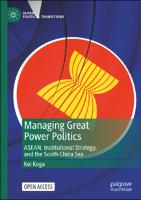Managing Great Power Politics
ASEAN, Institutional Strategy, and the South China Sea
Abstract
This Open Access book explains ASEAN’s strategic role in managing great power politics in East Asia. Constructing a theory of institutional strategy, this book argues that the regional security institutions in Southeast Asia, ASEAN and ASEAN-led institutions have devised their own institutional strategies vis-à-vis the South China Sea and navigated the great-power politics since the 1990s. ASEAN proliferated new security institutions in the 1990s and 2000s that assumed a different functionality, a different geopolitical scope, and thus a different institutional strategy. In so doing, ASEAN formed a “strategic institutional web” that nurtured a quasi-division of labor among the institutions to maintain relative stability in the South China Sea. Unlike the conventional analysis on ASEAN, this study disaggregates “ASEAN” as a collective regional actor into specific individual institutions—ASEAN Foreign Ministers’ Meeting, ASEAN Summit, ASEAN-China dialogues, ASEAN Regional Forum, East Asia Summit, and ASEAN Defense Ministers Meeting and ASEAN Defense Ministers Meeting-Plus—and explains how each of these institutions has devised and/or shifted its institutional strategy to curb great powers’ ambition in dominating the South China Sea while navigating great power competition. The book sheds light on the strategic potential and limitations of ASEAN and ASEAN-led security institutions, offers implications for the future role of ASEAN in the Indo-Pacific region, and provides an alternative understanding of the strategic utilities of regional security institutions.
Keywords
ASEAN; Institutional Strategy in Southeast Asia; Rise of China; Balance of Power in Southeast Asia; Secondary Power in Southeast Asia; Great Power Politics in Southeast Asia; East Asia; Power Shift in Asia; Regional Security Institution; South China Sea; ASEAN Regional Forum; ASEAN Defense Ministers Meeting; ADMM-Plus; ASEAN+3; East Asia Summit; ASEAN Ministerial Meeting; ASEAN SummitDOI
10.1007/978-981-19-2611-2ISBN
9789811926112, 9789811926112Publisher
Springer NaturePublisher website
https://www.springernature.com/gp/products/booksPublication date and place
Singapore, 2022Imprint
Palgrave MacmillanSeries
Global Political Transitions,Classification
International relations
Politics and government
International institutions
Diplomacy


 Download
Download Web Shop
Web Shop